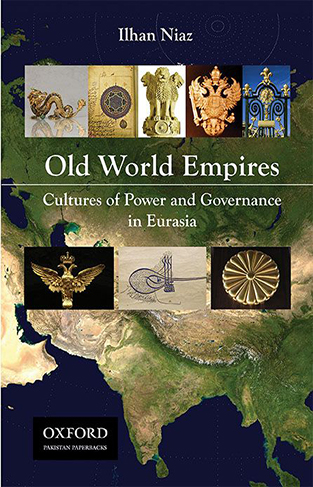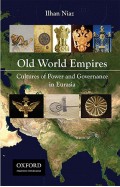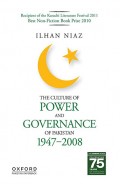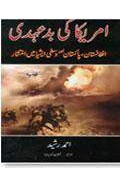- Home
- Books
- Categories
- Non Fiction
- History
- Old World Empires Cultures of Power and Governance in Eurasia
Old World Empires Cultures of Power and Governance in Eurasia
By: Ilhan Niaz
-
Rs 1,444.50
- Rs 1,605.00
- 10%
You save Rs 160.50.
Due to constant currency fluctuation, prices are subject to change with or without notice.
This book provides a one-volume historical survey of the origins, development, and nature of state power. It demonstrates that Eurasia is home to a dominant tradition of arbitrary rule mediated through military, civil, and ecclesiastical servants, and a marginal tradition of representative and responsible government through autonomous institutions. The former tradition finds expression in hierarchically organized and ideologically legitimated continental bureaucratic states while the latter manifests itself in the state of laws. In recent times, the marginal tradition has gained in popularity and has led to continental bureaucratic states attempting to introduce democratic and constitutional reforms.
These attempts have rarely altered the actual manner in which power is exercised by the state and its elites given the deeper and historically rooted experience of arbitrary rule. Far from being remote, the arbitrary culture of power that emerged in many parts of the world continues to shape the fortunes of states. To ignore this culture of power and the historical circumstances that have shaped it comes at a high price, as indicated by the ongoing democratic recession and erosion of liberal norms within states that are democracies.
This book provides a one-volume historical survey of the origins, development, and nature of state power. It demonstrates that Eurasia is home to a dominant tradition of arbitrary rule mediated through military, civil, and ecclesiastical servants, and a marginal tradition of representative and responsible government through autonomous institutions. The former tradition finds expression in hierarchically organized and ideologically legitimated continental bureaucratic states while the latter manifests itself in the state of laws. In recent times, the marginal tradition has gained in popularity and has led to continental bureaucratic states attempting to introduce democratic and constitutional reforms.
These attempts have rarely altered the actual manner in which power is exercised by the state and its elites given the deeper and historically rooted experience of arbitrary rule. Far from being remote, the arbitrary culture of power that emerged in many parts of the world continues to shape the fortunes of states. To ignore this culture of power and the historical circumstances that have shaped it comes at a high price, as indicated by the ongoing democratic recession and erosion of liberal norms within states that are democracies.
Old World Empires Cultures of Power and Governance in Eurasia
By: Ilhan Niaz
Rs 1,444.50 Rs 1,605.00 Ex Tax :Rs 1,444.50
The Culture of Power and Governance of Pakistan 1947-2008
By: Ilhan Niaz
Rs 945.00 Rs 1,050.00 Ex Tax :Rs 945.00
Zubin Mehta: A Musical Journey (An Authorized Biography)
By: VOID - Bakhtiar K. Dadabhoy
Rs 892.50 Rs 1,050.00 Ex Tax :Rs 892.50
The Culture of Power and Governance of Pakistan 1947-2008
By: Ilhan Niaz
Rs 945.00 Rs 1,050.00 Ex Tax :Rs 945.00
On Writing Well: The Classic Guide to Writing Nonfiction
By: William Zinsser
Rs 3,865.50 Rs 4,295.00 Ex Tax :Rs 3,865.50
No-Win War :The Paradox of US-Pakistan Relations in Afghanistan’s Shadow
By: Zahid Hussain
Rs 972.00 Rs 1,080.00 Ex Tax :Rs 972.00
Little America: The War within the War for Afghanistan :
By: Rajiv Chandrasekaran
Rs 1,197.50 Rs 2,395.00 Ex Tax :Rs 1,197.50
America Ki Bad Ehdi:Afghanistan Pakistan aur Wasti Asia main Intishar
By: Ahmed Rashid
Rs 1,345.50 Rs 1,495.00 Ex Tax :Rs 1,345.50
The Origins of Political Order From Prehuman Times to the French RevolutioN
By: Francis Fukuyama
Rs 4,045.50 Rs 4,495.00 Ex Tax :Rs 4,045.50
Manning Up: How the Rise of Women Has Turned Men into Boys
By: Kay Hymowitz
Rs 845.75 Rs 995.00 Ex Tax :Rs 845.75
The Obama Syndrome: Surrender At Home War Abroad
By: Tariq Ali
Rs 1,100.75 Rs 1,295.00 Ex Tax :Rs 1,100.75
The Quest For Meaning: Developing A Philosophy Of Pluralism
By: Tariq Ramadan
Rs 1,185.75 Rs 1,395.00 Ex Tax :Rs 1,185.75
The Pakistan US Conundrum Jihadists The Military And The People The Struggle For Control
By: Yunas Samad
Rs 1,185.75 Rs 1,395.00 Ex Tax :Rs 1,185.75
An Enemy We Created: The Myth Of The Taliban Al Qaeda Merger In Afghanistan 19702010
By: Alex Strick van Linschoten
Rs 4,197.50 Rs 8,395.00 Ex Tax :Rs 4,197.50
WikiLeaks: Inside Julian Assanges War on Secrecy
By: David Leigh & Luke Harding
Rs 637.50 Rs 850.00 Ex Tax :Rs 637.50
The Culture of Power and Governance of Pakistan 1947-2008
By: Ilhan Niaz
Rs 945.00 Rs 1,050.00 Ex Tax :Rs 945.00
On Writing Well: The Classic Guide to Writing Nonfiction
By: William Zinsser
Rs 3,865.50 Rs 4,295.00 Ex Tax :Rs 3,865.50
No-Win War :The Paradox of US-Pakistan Relations in Afghanistan’s Shadow
By: Zahid Hussain
Rs 972.00 Rs 1,080.00 Ex Tax :Rs 972.00
Little America: The War within the War for Afghanistan :
By: Rajiv Chandrasekaran
Rs 1,197.50 Rs 2,395.00 Ex Tax :Rs 1,197.50
America Ki Bad Ehdi:Afghanistan Pakistan aur Wasti Asia main Intishar
By: Ahmed Rashid
Rs 1,345.50 Rs 1,495.00 Ex Tax :Rs 1,345.50
Awaken the Giant within: How to Take Immediate Control of Your Mental, Emotional, Physical and Financial Life
By: Tony Robbins
Rs 2,965.50 Rs 3,295.00 Ex Tax :Rs 2,965.50
Harry Potter And The Philosophers Stone
By: J. K. Rowling
Rs 1,950.75 Rs 2,295.00 Ex Tax :Rs 1,950.75
Zubin Mehta: A Musical Journey (An Authorized Biography)
By: VOID - Bakhtiar K. Dadabhoy
Rs 892.50 Rs 1,050.00 Ex Tax :Rs 892.50
Old World Empires Cultures of Power and Governance in Eurasia
By: Ilhan Niaz
Rs 1,444.50 Rs 1,605.00 Ex Tax :Rs 1,444.50
The Culture of Power and Governance of Pakistan 1947-2008
By: Ilhan Niaz
Rs 945.00 Rs 1,050.00 Ex Tax :Rs 945.00
The Culture of Power and Governance of Pakistan 1947-2008
By: Ilhan Niaz
Rs 945.00 Rs 1,050.00 Ex Tax :Rs 945.00
On Writing Well: The Classic Guide to Writing Nonfiction
By: William Zinsser
Rs 3,865.50 Rs 4,295.00 Ex Tax :Rs 3,865.50
No-Win War :The Paradox of US-Pakistan Relations in Afghanistan’s Shadow
By: Zahid Hussain
Rs 972.00 Rs 1,080.00 Ex Tax :Rs 972.00
Little America: The War within the War for Afghanistan :
By: Rajiv Chandrasekaran
Rs 1,197.50 Rs 2,395.00 Ex Tax :Rs 1,197.50
America Ki Bad Ehdi:Afghanistan Pakistan aur Wasti Asia main Intishar
By: Ahmed Rashid
Rs 1,345.50 Rs 1,495.00 Ex Tax :Rs 1,345.50
















-120x187.jpg?q6)










-120x187.jpg?q6)



-120x187.jpg?q6)







